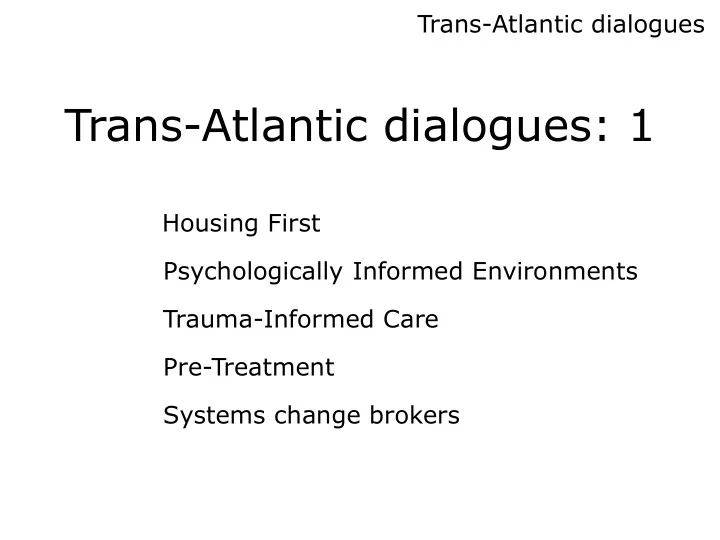

Trans-Atlantic dialogues Trans-Atlantic dialogues: 1 Housing First Psychologically Informed Environments Trauma-Informed Care Pre-Treatment Systems change brokers
Trans-Atlantic dialogues Housing First Rapid (re-)housing Voluntaristic support model Committed staff support Harm reduction vs abstinence Focus on the most severe + Strong evidence base
Trans-Atlantic dialogues Psychologically Informed Environments A Psychological Model The Built Environment Staff Training & Support Managing relationships/ rules of engagement Evidence-generating practice change + Reflective Practice
Trans-Atlantic dialogues Trauma Informed Care Awareness of the nature & expression of past trauma An emphasis on safety Opportunities to rebuild control A ‘ strengths-based ’ approach + Any other key features?
PIEs & TIC? By Krishnavedala – Own work, CC BY-SA 3.0, https://commons.wikimedia.org/w/index.php?curid=15278313
Trans-Atlantic dialogues Pre-Treatment Rapid (re-)housing) Voluntaristic support philosophy Committed staff support Harm reduction vs abstinence “ Get where the client is at ”
Trans-Atlantic dialogues System Change Brokers A small cohort & keyworker team Inter-agency ownership of lessons Action learning & feedback Systemic Exclusion A social model of disability
Trans-Atlantic dialogues Inter-connectivity?
Trans-Atlantic dialogues Convergent evolution?
Trans-Atlantic dialogues Cultural transmission?
Trans-Atlantic dialogues Independent local development
Trans-Atlantic dialogues Local adaptations? By Joey Roe – Own work, CC BY-SA 3.0, https://commons.wikimedia.org/w/index.php?curid=12176717
Trans-Atlantic dialogues Trans-Atlantic dialogues: 2
Trans-Atlantic dialogues Trans-Atlantic dialogues: 3
Recommend
More recommend